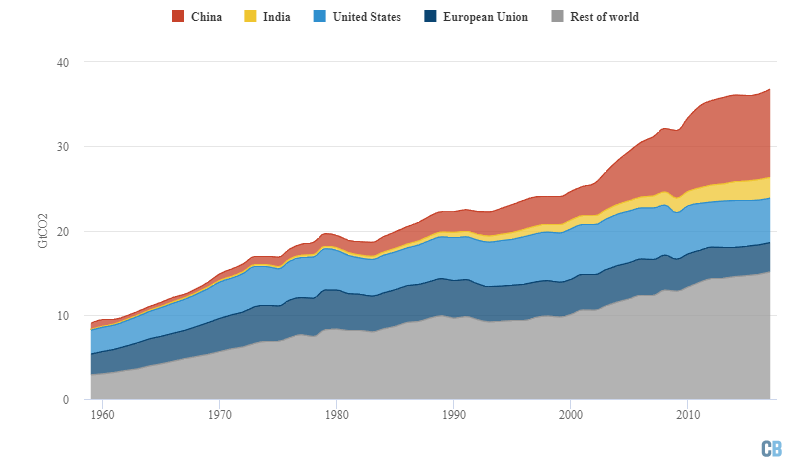Plants are Losing Their Capacity to Absorb Human CO2 Emissions
A new report published Wednesday in Nature suggests that Earth's vegetation may not be able to continue to absorb human carbon dioxide emissions at current rates, which could accelerate climate change and exacerbate its effects.
Humans pump nearly 40 billion tons of carbon dioxide into the atmosphere every year and about 50 percent of these emissions are absorbed by plants in the terrestrial and ocean biospheres. The negative effects of the large amounts of carbon dioxide being absorbed by Earth's vegetation can be seen in unprecedented coral bleaching events and the acidification of the ocean.
Although carbon dioxide is necessary for plants to grow, there is a limit to how much CO2 they can absorb. According to the lead authors of the new study, Columbia University environmental engineer Pierre Gentine and his doctoral student Julia Green, the impact of extreme events like droughts and floods on soil are decreasing the amount of CO2 that Earth's vegetation an absorb.
Read More:The Seafloor is Dissolving Because of Climate Change
The rates that plants can absorb greenhouse gasses is largely dictated by how variations in the water cycle-such as droughts and floods-affect the soil. Gentine and Green used four different climate models to analyze net biome productivity (NBP), which is equal to the amount of carbon used by plants and the soil in a given region minus the amount of carbon lost due to things like forest fires or forest harvesting. They were looking specifically at how soil moisture affects the NBP by analyzing long-term drying trends in soil and the impact of extreme, short-term events like floods and droughts on soil.
"Essentially, if there were no droughts and heat waves, if there were not going to be any long-term drying over the next century, then the continents would be able to store almost twice as much carbon as they do now," Gentine said in a statement.
According to the study, the variations in soil moisture from droughts and floods are already reducing the Earth's ability to absorb carbon at current levels.
 Annual CO2 emissions by country from 1960 to 2017. Image: CarbonBrief
Annual CO2 emissions by country from 1960 to 2017. Image: CarbonBrief"This is a big deal," Gentine said. "If soil moisture continues to reduce the net biome productivity at the current rate, and the rate of carbon uptake by the land starts to decrease by the middle of this century-as we found in the models-we could potentially see a large increase in the concentration of atmospheric CO2 and a corresponding rise in the effects of global warming and climate change."
In short, the ability of plants and the soil to absorb carbon dioxide from the atmosphere is already being affected by the varying and extreme weather events produced by human-driven climate change. As these effects become more pronounced, they will further limit the Earth from absorbing carbon dioxide, thereby exacerbating the extreme weather creating a vicious cycle.
Gentine said that the study highlights the need to dedicate more resources to studying the way plants respond to water stress so that these findings can be better incorporated into models.
In the meantime, Gentine said, "We all really need to act now to avoid greater consequences of climate change."